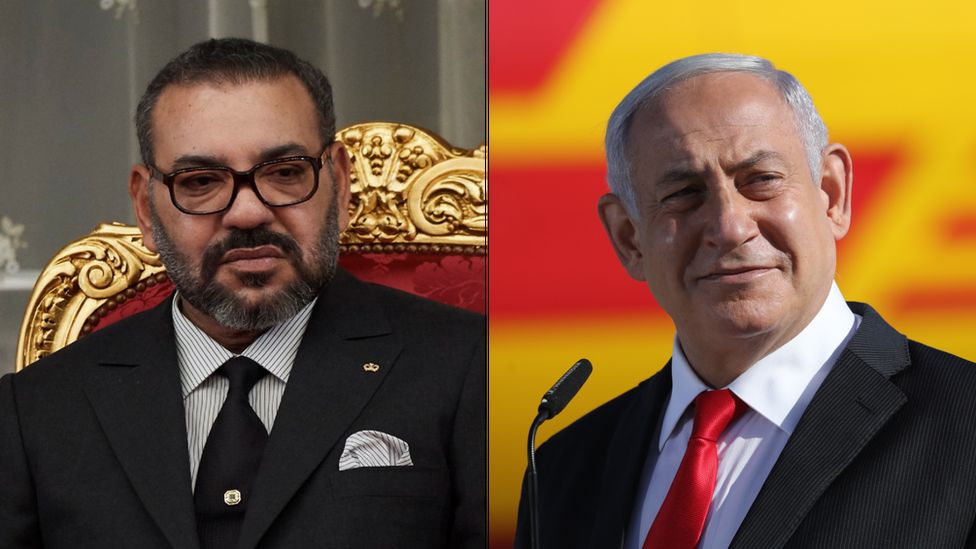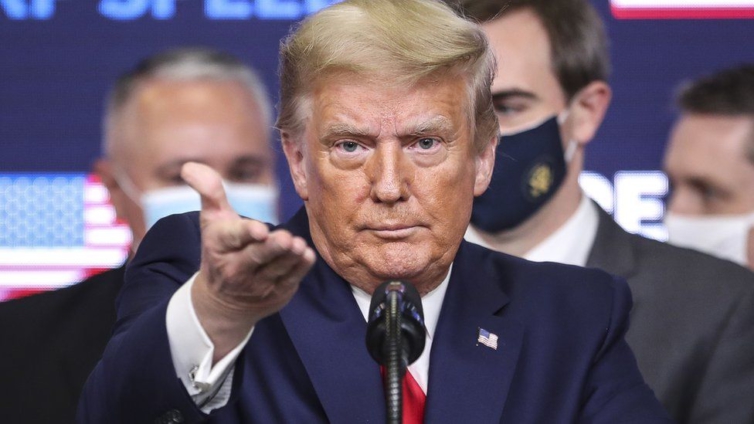Morocco has become the latest Arab League country to agree to normalize relations with Israel in a deal brokered with US help.
As part of the deal, the US has agreed to recognize Morocco's claim over the disputed Western Sahara region.
It is the subject of a dispute between Morocco and the Algeria-backed Polisario Front, which has been seeking to establish an independent state.
Morocco is the fourth state to make such a deal with Israel since August.
Agreements have also been struck recently with the United Arab Emirates, Bahrain, and Sudan.
Along with Egypt and Jordan, Morocco becomes the sixth Arab League member to normalize ties with Israel.
What is the deal?

US President Donald Trump announced the agreement on Twitter on Thursday.
"Another HISTORIC breakthrough today! Our two GREAT friends Israel and the Kingdom of Morocco have agreed to full diplomatic relations - a massive breakthrough for peace in the Middle East!" he wrote.
The White House said Mr Trump and Morocco's King Mohammed VI had agreed that Morocco would "resume diplomatic relations between Morocco and Israel and expand economic and cultural co-operation to advance regional stability".
The deal includes the reopening of liaison offices in Tel Aviv and Rabat - shut in 2000 when low-level relations broke down after the outbreak of the Palestinian uprising - and the eventual opening of embassies. Officials said Morocco would grant direct flights to and from Israel for all Israelis.
Israeli Prime Minister Benjamin Netanyahu hailed the "historic" agreement.
In a televised address, he thanked Morocco's king and said the people of Israel and Morocco have had a "warm relationship in the modern period".
In Morocco, a palace statement confirmed the deal, saying the king, in a telephone call with Mr Trump, had agreed to diplomatic relations with Israel "with minimal delay".
Egypt, the UAE, and Bahrain issued statements welcoming the deal between Morocco and Israel.
Palestinian officials condemned the agreement, saying it encouraged Israel's denial of their rights.
Palestinians have been critical of all the recent deals between Israel and Arab League countries. They believe the moves renege on a promise by Arab states not to embrace ties with Israel until Palestinian statehood is achieved.
Morocco's king said the "measures do not in any manner affect Morocco's ongoing and sustained commitment to the just Palestinian cause", a royal statement said.
The statement added that the king had spoken with Palestinian Authority President Mahmoud Abbas and assured him that he "would never relinquish his role in defending the legitimate rights of the Palestinian people".
It said the king had reiterated his support for a two-state solution.
What about Western Sahara?
The White House said the US would recognize Morocco's claim over Western Sahara as part of the deal.
In a phone call with the Moroccan king, Mr Trump "reaffirmed his support for Morocco's serious, credible, and realistic autonomy proposal as the only basis for a just and lasting solution to the dispute over the Western Sahara territory and as such the president recognized Moroccan sovereignty over the entire Western Sahara territory," the White House said.
A former Spanish colony, it was annexed by Morocco in 1975. Since then it has been the subject of a long-running territorial dispute between Morocco and its indigenous Saharawi people, led by the pro-independence Polisario Front.
Morocco says it has always been part of its territory, while the African Union recognizes it as an independent state.
A 16-year-long insurgency ended with a UN-brokered truce in 1991 and the promise of a referendum on independence, which has yet to take place.
Responding to the latest announcement, Sidi Omar, the Polisario Front's representative to the UN, said Western Sahara's "legal status is determined by international law and UN resolutions".
"The move shows that Morocco's regime is willing to sell its soul to maintain its illegal occupation of parts of Western Sahara," he wrote on Twitter.
The group's Europe representative, Oubi Bchraya, said the change in US policy "will not change an inch of the reality of the conflict and the right of the people of Western Sahara to self-determination", Reuters reports.
Last month, the Polisario Front said the three-decades-old ceasefire had been ended by a Moroccan military operation in a buffer zone.
Lotfi Bouchaara, Morocco's ambassador to Moscow, told the BBC's Focus on Africa program that Morocco did not breach the ceasefire but that its military was responding to a provocation by Polisario fighters who had blocked a key road to Mauritania.
Morocco had reacted with "restraint", he said.
A White House proclamation on Thursday said the US believed that an independent Sahrawi State is "not a realistic option for resolving the conflict and that genuine autonomy under Moroccan sovereignty is the only feasible solution".
Morocco's royal court said Washington would open a consulate in Western Sahara as part of its deal with Israel, according to Reuters.
How the deal will affect Western Sahara
Analysis by Rana Jawad, BBC North Africa correspondent, Tunis
The latest move by the Trump administration will not necessarily have an immediate impact on the ground because the dispute is seen as greater than the whims of the American president.
However, Trump's backing of Morocco's claim to sovereignty over Western Sahara is a big deal because it diminishes the hope of a people who have aspired for independence of that territory for decades.
The UN is still mandated to oversee a referendum for independence of Western Sahara - although this hasn't materialized since 1991 when it established its mission there, known as Minurso.
In the absence of a referendum, the protracted stalemate between Morocco and the Polisario Front ultimately boils down to international recognition a new independent state cannot be established without it.
Today, the idea of an independent Western Sahara may have been significantly diminished and the tensions that have been building up in recent months could worsen.
Latest Stories
-
We’ll embrace cutting-edge technologies to address emerging healthcare needs – Prof. Antwi-Kusi
19 minutes -
Nana Aba Anamoah, Cwesi Oteng to attend Philip Nai and Friends’ charity event
24 minutes -
Environmental protection officers receive training on how to tackle climate change
27 minutes -
CLOGSAG vows to resist partisan appointments in Civil, Local Government Service
2 hours -
Peasant Farmers Association welcomes Mahama’s move to rename Agric Ministry
2 hours -
NDC grateful to chiefs, people of Bono Region -Asiedu Nketia
2 hours -
Ban on smoking in public: FDA engages food service establishments on compliance
2 hours -
Mahama’s administration to consider opening Ghana’s Mission in Budapest
2 hours -
GEPA commits to building robust systems that empower MSMEs
2 hours -
Twifo Atti-Morkwa poultry farmers in distress due to high cost of feed
2 hours -
Central Region PURC assures residents of constant water, power supply during yuletide
2 hours -
Election victory not licence to misbehave – Police to youth
2 hours -
GPL 2024/2025: Nations thrash struggling Legon Cities
2 hours -
Electoral offences have no expiry date, accountability is inevitable – Fifi Kwetey
2 hours -
Ghanaians to enjoy reliable electricity this Christmas – ECG promises
2 hours

